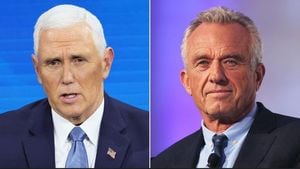The Canadian government is bracing itself for what promises to be another challenging financial year, as recent projections for the fiscal year 2024-25 indicate a budget deficit reaching approximately $43 billion. This figure is significant, more than doubling the anticipated deficit outlined for the previous year.
This spike is largely attributed to rising interest rates, which have dramatically escalated the costs associated with servicing Canada’s burgeoning debt. Over the past few months, as inflation has continued to pose challenges to the economy, the Bank of Canada has enacted several interest rate hikes, which have compelled the borrowing costs to rise sharply.
During the previous fiscal year ending April 2024, the government had originally anticipated then reported a deficit closer to $20 billion — already considered substantial. Face it or not, the reality for many within Canada now is coming to terms with the complications these rising expenses bring.
Federal Finance Minister, Kristia Freeland, who has been at the helm of crafting the budget, underscored the necessity for fiscal discipline. “It is imperative we navigate these financial waters responsibly,” she remarked during her address to Parliament, emphasizing the need for calculated spending.
The government's strategy moving forward seems to be rooted deeply within limiting spending and prioritizing economic stability. This is easier said than done, as the government faces mounting pressure from various sectors advocating for increased investments to tackle climate change and bolster social services.
Interestingly, public sentiment appears to be split. Many Canadians are beginning to feel the pinch of increased living costs, with essentials becoming more expensive. Coupled with the rising cost of borrowing, many families are worried about how these financial challenges will impact their budgets moving forward. Nevertheless, the other part of the population, perhaps more fiscally conservative, endorses the need for caution and restraint.
Some experts are pointing to potential pathways for recovery, explaining how investing smartly during these economically challenging times could yield dividends down the road. They advocate for carefully selected programs rather than blanket increases across the board. These experts believe there’s opportunity within the crisis for structural adjustments within government budgeting processes.
The broader economic picture remains complex. Canada is expected to experience slow growth over the next fiscal year, alongside elevated inflation. According to the latest reports, the economy is projected to grow at less than two percent. This slower pace of growth could compound the already tricky situation for the fiscal framework.
The Canadian government can’t ignore the rising profile of national debt, now nearing $1.2 trillion. Fiscal experts have been voicing concerns about the potential long-term impacts, cautioning against complacency with spending. This wave of debt servicing costs will almost encumber any additional fiscal maneuvering, which leaves the government’s hands tied.
Fueling concerns is the notion of borrowing more money to finance deficits, which often leads to increased scrutiny from both economists and the public at large. Critics argue such strategies may only deepen the financial pitfalls already experienced.
Freeland and her team are tackling these challenges head-on, aiming to provide clarity on how they plan to navigate through this period. One key area on which they are focused is productivity; raising it significantly could streamline services without overspending.
With this fiscal backdrop, it is equally important to note the international environment. Canada’s economy remains interconnected with global markets, and economic instability elsewhere can have ripple effects back home. Analysts caution the government to remain vigilant and adaptable as they move forward.
The upcoming budget announcement later this month is likely to shine more light on the government’s vision of where they see Canada heading. Freeland has made it clear the focus will be on sustainability and resilience.
All eyes will be on the budget proposal as Canadians await how the administration plans to balance fiscal prudence with the growing demands for investment. The stakes are high, and the feedback from the public will undoubtedly influence future government actions.
Overall, the projected budget deficit is not merely a number on paper but reflects the government's choices, priorities, and the economic realities all Canadians confront daily. Now is the time to make decisions with long-lasting impact at the forefront of fiscal policy discussions.



